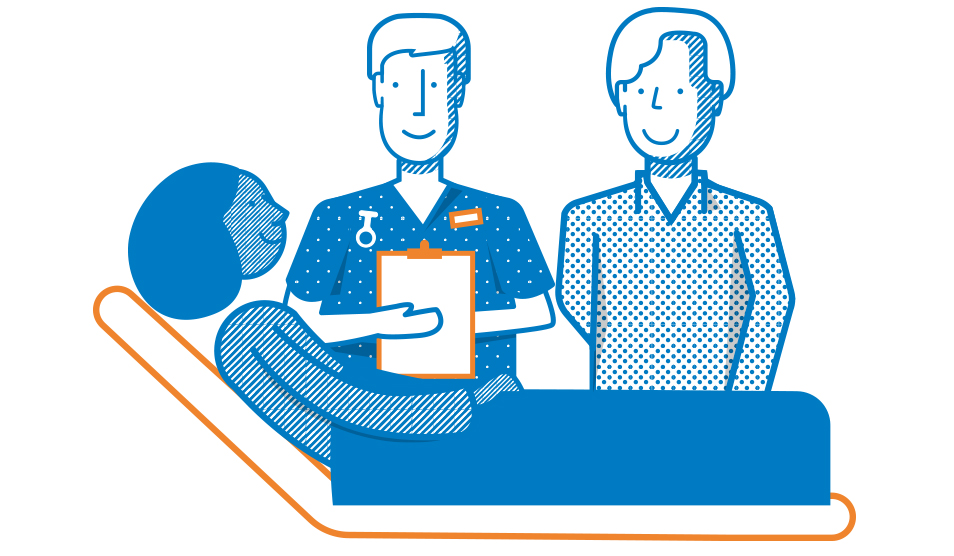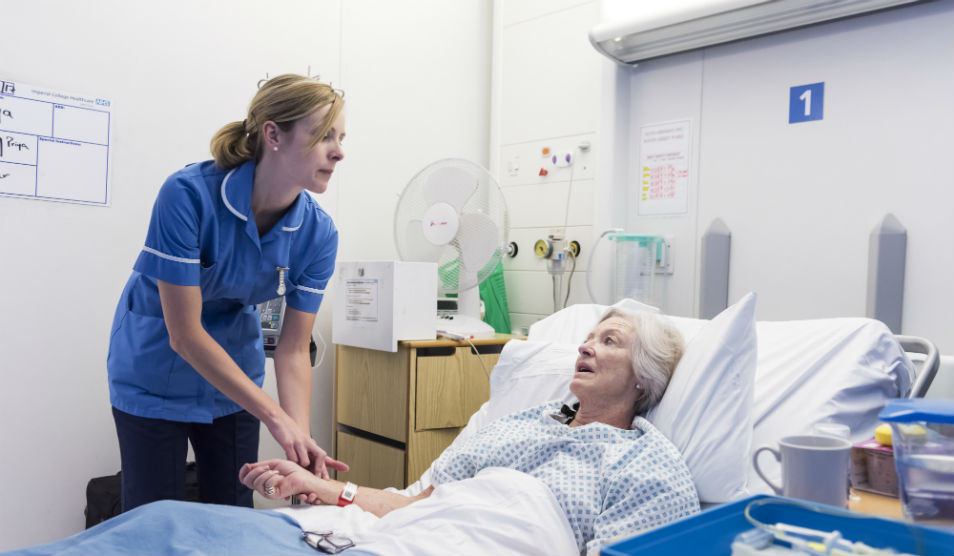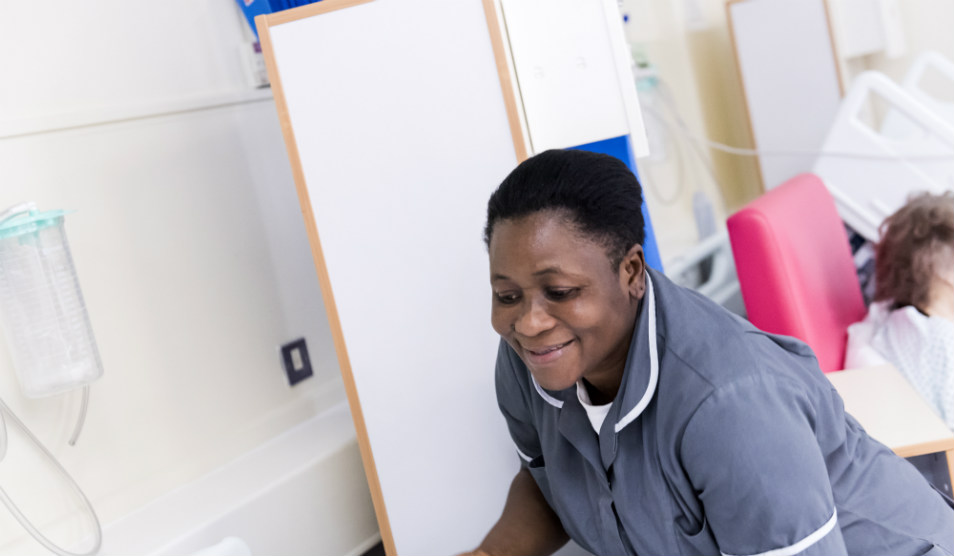Stroke
Contact
- Outpatients appointments
- 020 3313 5000
Visitor Information
Translation help:
To translate this page into your preferred language, click the Google Translate icon in the top-right menu and select your desired language.
A stroke is a serious medical condition that occurs when the blood supply to part of the brain is cut off.
Strokes are a medical emergency and prompt treatment is essential – the sooner a person receives treatment for a stroke, the less damage is likely to happen. All our stroke patients are given a CT brain scan on the day of their admission, most within an hour, to help with diagnosis and to quickly assess any damage to the brain. Through our Trust’s stroke centre, we offer immediate investigations, ongoing management and rehabilitation services for patients who have had strokes.
Survival rates for Imperial College Healthcare NHS Trust stroke patients are amongst the highest in the country. We admit approximately 1,700 patients per year through our hyper acute stroke unit, and receive around 900 emergency calls for patients who may be suitable for clot busting interventions.
Our Trust’s stroke centre comprises:
- a hyper acute stroke unit at Charing Cross Hospital
- A thrombolysis (clot busting) service provided 24 hours a day, seven days a week within Charing Cross Hospital’s emergency department
- a stroke unit at Charing Cross Hospital
- Transient ischaemic attack (TIA) ‘mini stroke’ investigation services at Charing Cross Hospital
- outpatient follow-up clinics at Charing Cross and St Mary’s hospitals
Conditions and treatments
We have ready access to advanced neuro-imaging and work closely with our neuro-radiology colleagues to optimise every patient’s specific diagnosis. Our stroke wards are staffed by specially trained nurses and therapists to provide high quality standards of care.
Rapid access TIA clinics
Specialist review is available in our neurovascular clinic, which sees high-risk TIA patients within 24 hours from receipt of referral, and within a week for all others. Neuro-surgical and vascular surgical intervention is available on-site. The team also includes stroke specialist registrars (SpRs), clinical nurse specialists and multidisciplinary therapists.
TIA is a similar condition to a stroke. The blood supply to the brain is temporarily interrupted, causing a ‘mini stroke’. People fully recover within 24 hours or less. However, as it can be a warning sign ahead of a full stroke, it is important that TIAs are treated very seriously and a person experiencing a mini stroke is seen quickly by a specialist.
Stroke units
After initial investigation and stabilisation in the hyper acute stroke unit, patients will move onto a local stroke unit for ongoing management by medical, nursing and therapy staff, either within the Trust or at a hospital closer to home.
Stroke patients are all reviewed by a consultant stroke physician and a neurologist to optimise investigation and management. The ward managers and stroke clinical nurse specialists will provide information for discharged patients, and stroke SpRs can offer specialist advice. Patients are seen in an outpatient follow-up clinic following their discharge.
Rehabilitation and support
A variety of therapists will work together with the nurses and doctors to help patients regain as much independence as possible following a stroke. This may continue for some time. The rehabilitation team will support and assist patients by identifying goals, and by developing a treatment plan to help achieve them. The team also starts planning a patient’s discharge from the first day of their admission and always keeps the patient involved in the decision process.
Our stroke service offers clinics and services at Charing Cross and St Mary’s hospitals.
Clinics
Rapid access TIA clinic at Charing Cross Hospital
Address
Stroke and neuroscience assessment unit
Ward 8 West
Eighth floor
West wing
Charing Cross Hospital
Fulham Palace Road
London W6 8RF
Contact information
Phone: 020 3311 1255
Outpatient follow-up clinic at Charing Cross Hospital
Address
Main outpatients department
First floor
Charing Cross Hospital
Fulham Palace Road
London W6 8RF
Hours
Clinic hours vary – please check your appointment letter for details.
Outpatient follow-up clinic at St Mary’s Hospital
Address
Main outpatients department
St Mary’s Hospital
Praed Street
London W2 1NY
Hours
Clinic hours vary – please check your appointment letter for details.
Meet the team
Consultant stroke physicians
Dr Soma Banerjee, head of specialty
Dr Marius Venter, associate medical director
Dr Lucio D’Anna
Dr Omid Halse
Dr Dheeraj Kalladka
Dr Joseph Kwan
Consultant neurologists
Dr Ieuan (Harri) Jenkins
Dr Pankaj Sharma
Dr Paul Bentley
Lead nurse for stroke services
Mr Brenton Key
Clinical nurse specialists
Ms Tsering Dolkar
Ms Astha Kafle
Therapy leads
Ms Davina Richardson, clinical service lead therapist (neurosciences and major trauma)
Ms Louise Penny, clinical lead therapist, acute stroke unit
Ms Victoria Atheron, clinical lead therapist, hyper acute stroke unit
Patient information
Before your appointment
You will receive an outpatient follow-up appointment four to six weeks after referral. If you cannot remember your symptoms it would be helpful if you could bring a family member or someone who witnessed your attack with you to the appointment. Please remember to bring a list of all your medications with you to your appointment.
During your appointment
You will be greeted by the clinical nurse specialist (CNS) who will show you into the clinic room and take a blood pressure reading, measure your pulse and take your temperature. Once all your details have been checked, the doctor will perform a clinical examination and ask you about your symptoms.
After your initial examination, the team will decide which tests are most appropriate. You are likely to receive blood tests, ECG, a CT brain scan and carotid Doppler studies (a neck ultrasound). These tests will all be performed on the day of your appointment. Following your tests, you will return to the ward and see the doctor and clinical nurse specialist again, who will review all your results and give specialist advice and medication as required. Further tests may be required and you will be informed of these before you leave the clinic. You will then be discharged and a follow-up appointment will be sent in the post.
After your appointment
Along with recommending some lifestyle changes to reduce the risk of a future stroke, we will probably prescribe you medications to reduce the risk of further blood clots, to control high blood pressure, or control high cholesterol. You must tell your GP if you experience any problems while taking these drugs.
If the carotid Doppler study found that your stroke was caused by a severe blockage of the carotid arteries on either side of your neck, then you may be referred for surgery. An operation known as a carotid endarterectomy is done to unblock the narrowed carotid artery and reduce the risk of further stroke by improving the blood supply to the brain. The operation can be done under local or general anaesthetic. The length of hospital stay after surgery varies and will depend on your recovery and wellbeing. Your doctor will discuss this with you individually.
Stroke support group
Every month, we hold a stroke support group to encourage stroke survivors, their carers and family members to confidently enjoy life after stroke through provision of information, education, advice and support. Attendance is free and everyone is welcome.
To register to attend this group, please contact our clinical nurse specialists in stroke.
Phone: 020 3311 5445
Email: imperial.stroke.cns@nhs.net
Refer to this service
GP referrals
If you suspect a stroke, please dial 999.
For acute inpatient referrals or to discuss any patients, please contact the on-call specialist registrar at Charing Cross Hospital via the main hospital switchboard.
Phone: 020 3311 1234
Bleep: 0383
Our clinical nurse specialists (CNS) are also available on site via the main hospital switchboard if you have any queries or would like further advice.
Phone: 020 3311 1234
Bleep: 3643 or 7837
TIA referrals
Please Click here to download a copy of the referral form for TIA, complete it and email it to our service
Email: imperial.tia.clinic@nhs.net
Please ensure you complete the form in full to enable the team to appropriately screen the referral.
For Charing Cross TIA services, please contact the TIA administrator.
Phone: 020 3311 1255
Our clinical nurse specialists (CNS) are also available on site via the main hospital switchboard if you have any queries or would like further advice.
Phone: 020 3311 1234
Bleep: 3643 or 7837
As part of the referral process for TIA clinics an ABCD2 should be performed and documented on the referral form. This allows the CNS or the SpR to screen the referral and identify high risk and low risk patients and to triage them into the clinic accordingly. Please also provide a list of the patient's current medication with your referral.
Stroke and neurosciences advice service for GPs
In the case of an emergency or for time-critical queries, GPs should contact the on call specialist registrar by calling the hospital’s switchboard.
GPs and practice staff can contact our stroke and neurosciences medical specialists directly with clinical queries and general questions through the Trust’s new pilot GP advice service.
Email: strokeandneurosciences.imperial@nhs.net
GP advice lines are available from 12.00 to 14.00, Monday to Friday. We will try our best to respond to email queries within 24 hours (except weekends and bank holidays). Queries relating to specific patient referrals should be directed to the GP bookings office hotline.
Phone: 020 3313 5060
Please note, this service is for enquiries from GPs and practice staff only. If you are a patient with a query, please contact our patient advice and liaison service (PALS). For contact details and further information, please visit our PALS page.
Additional information
Clinical trials and research
We endeavour to perform stroke-related research as often as possible as part of our regular service. We aim to offer all patients the opportunity to participate in a research study. We currently have a total of 24 stroke research studies taking place across the Trust, covering all areas of stroke care from hyper acute to rehabilitation.
Further online resources
Take our friends and family test Learn more
Would you recommend our services to your friends and family? Let us know by completing our friends and family test. Your comments will help us to make changes and take immediate action when there’s a problem.



